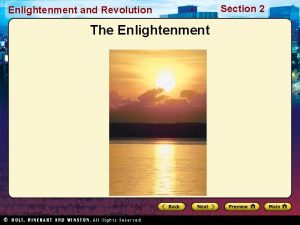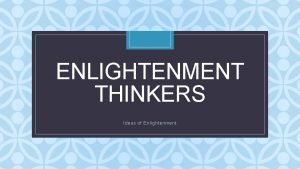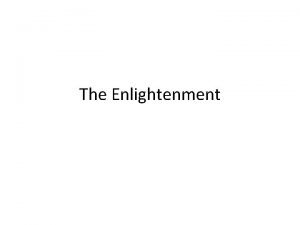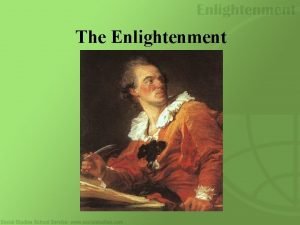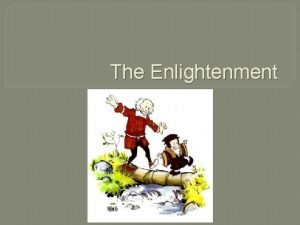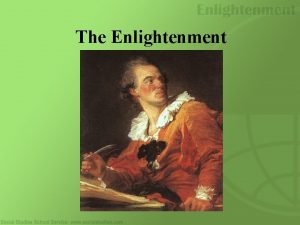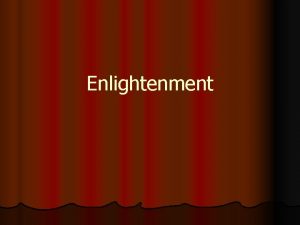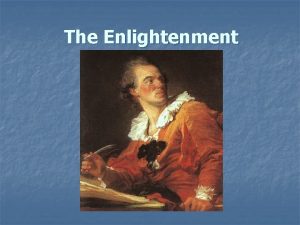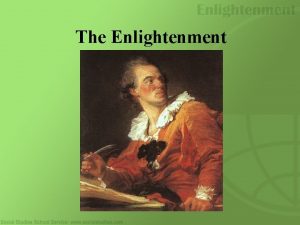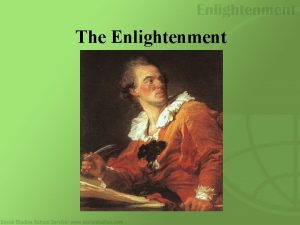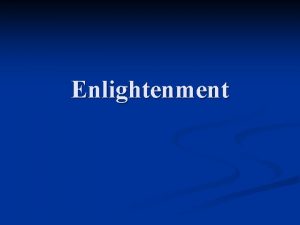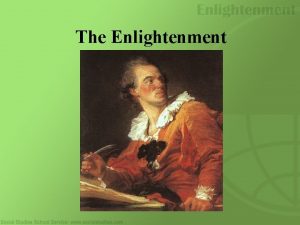THE ENLIGHTENMENT What Was the Enlightenment The Enlightenment














- Slides: 14

THE ENLIGHTENMENT

What Was the Enlightenment? The Enlightenment was an intellectual movement in Europe during the 18 th century that led to a whole new world view.

The Scientific Revolution The Enlightenment grew largely out of the new methods and discoveries achieved in the Scientific Revolution The equatorial armillary, used for navigation on ships

Enlightenment Principles Religion, tradition, and superstition limited independent thought Accept knowledge based on observation, logic, and reason, not on faith Scientific and academic thought should be secular A meeting of French Enlightenment thinkers

The French Salon and the Philosophes • Madame de Pompadour • Salons: gatherings for aristocrats to discuss new theories and ideas • Philosophes: French Enlightenment thinkers who attended the salons Madame de Pompadour

Day 2 Enlightenment

Voltaire (1694– 1778) Most famous philosophe Wrote plays, essays, poetry, philosophy, and books Attacked the “relics” of the medieval social order Championed social, political, and religious tolerance

The Encyclopédie Major achievement of the philosophes Begun in 1745; completed in 1765 Banned by Catholic church Frontspiece to the Encyclopédie

Thomas Hobbes (1588– 1679) Believed that humans were basically driven by passions and needed to be kept in check by a powerful ruler

John Locke (1632– 1704) The “State of Nature” Tabula rasa Treatises of Government Rights

Jean-Jacques Rousseau (1712– 1778) Philosophized on the nature of society and government The Social Contract

Baron de Montesquieu (1689– 1755) • French noble and political philosopher • The Spirit of the Laws • Separation of powers • Constitutional monarchy

Women and the Enlightenment Changing views Role of education Equality Mary Wollstonecraft Olympe de Gouges

The Legacy of the Enlightenment Government Society Education The signing of the U. S. Constitution
 V cc cc
V cc cc Thể thơ truyền thống
Thể thơ truyền thống Trời xanh đây là của chúng ta thể thơ
Trời xanh đây là của chúng ta thể thơ Gấu đi như thế nào
Gấu đi như thế nào Hổ sinh sản vào mùa nào
Hổ sinh sản vào mùa nào đại từ thay thế
đại từ thay thế Diễn thế sinh thái là
Diễn thế sinh thái là Vẽ hình chiếu vuông góc của vật thể sau
Vẽ hình chiếu vuông góc của vật thể sau Thế nào là hệ số cao nhất
Thế nào là hệ số cao nhất Ng-html
Ng-html Thế nào là mạng điện lắp đặt kiểu nổi
Thế nào là mạng điện lắp đặt kiểu nổi Lời thề hippocrates
Lời thề hippocrates Vẽ hình chiếu đứng bằng cạnh của vật thể
Vẽ hình chiếu đứng bằng cạnh của vật thể Quá trình desamine hóa có thể tạo ra
Quá trình desamine hóa có thể tạo ra Cách giải mật thư tọa độ
Cách giải mật thư tọa độ















